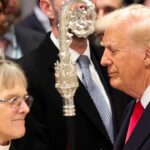Most recently, Musk spread conspiracy theories about Muslim “grooming gangs” in the UK, and called for Tommy Robinson, a far-right activist, to be released from prison. Musk’s support for Robinson, who has a history of posting racist and Islamophobic content, initially saw Reform UK leader Nigel Farage push back against the X owner. But in a TV show he hosts on the right-wing GB News station this week, Farage appeared to bend the knee to Musk.
“I don’t think [Robinson’s] wrong in everything he says,” Farage told his viewers. “I do question why he’s in prison, and being kept in solitary confinement.” (Robinson is in prison after being found in contempt of court for repeating lies about a Syrian refugee.)
Last year, Musk spent months antagonizing Brazilian supreme court justice Alexandre de Moraes after the court issued orders for X to remove a handful of accounts and content that, it said, had violated the law by undermining faith in the integrity of the country’s elections. After Brazil’s right-wing president Jair Bolsonaro lost his re-election bid in 2022, his supporters stormed the country’s legislature on January 8, 2023, claiming that the election had been stolen (it hadn’t), in an echo of the January 6, 2021 insurrection at the US Capitol. Moraes was a staunch opponent of Bolsonaro. X spent months refusing to obey the order, even turning over sealed court orders to the US Congress’ Subcommittee on the Weaponization of the Federal Government, led by right-wing congressman Jim Jordan, which then released them publicly.
At the time, many in Brazil felt that Musk’s actions, as well as the release of the orders, were a move to undermine the country’s democracy and sovereignty. The Brazilian court eventually issued an order to block X in the country for noncompliance and issued a fine against Musk-owned Starlink, after which X complied with the orders.
He also fiercely attacked Nicolas Maduro, president of Venezuela, during the country’s elections (which many in the international community believe to have been rigged).
“He has established himself as a powerful connection hub between different groups of people across many countries,” says Christian Katzenbach, professor of media and communication at the University of Bremen. Those groups include people in the tech industry, moderate conservatives, advocates of economic liberalism, and right-wing movements. “These groups did not have many connections in the past, but increasingly align on opposing modern mid/left governments.” By amplifying a variety of voices, he says, Musk is actively bringing right-wind perspectives into mainstream debates and opening up new population groups as voters for right-wing parties.
Even outside of elections, Musk appears to be building alliances with like-minded leaders. In April, Musk met with Argentina’s right-wing president Javier Milei. Milei’s government has slashed spending in ways that Musk said in an X post “will be a helpful model for the rest of the world.” Argentina’s poverty rate under Milei’s government has risen to over 50 percent.
And while Musk certainly seems to be motivated by particular political ideologies, Katzenbach notes that Musk’s involvement in European politics could benefit his business interests, particularly by rolling back social media regulations in the bloc or opening new avenues for his companies. The EU is currently probing X for breaching the Digital Services Act (DSA), which could result in fines. In Italy, Musk is exploring a deal with the right-wing government led by Giorgia Meloni for a deal to launch satellite communications through Starlink to the tune of $1.5 billion, which would compete with a European satellite initiative.
“Internationally his motives are surely a mixed bag,” says Katzenbach. But either way, Musk seems determined to be a political force beyond any national border.
David Gilbert contributed reporting.







